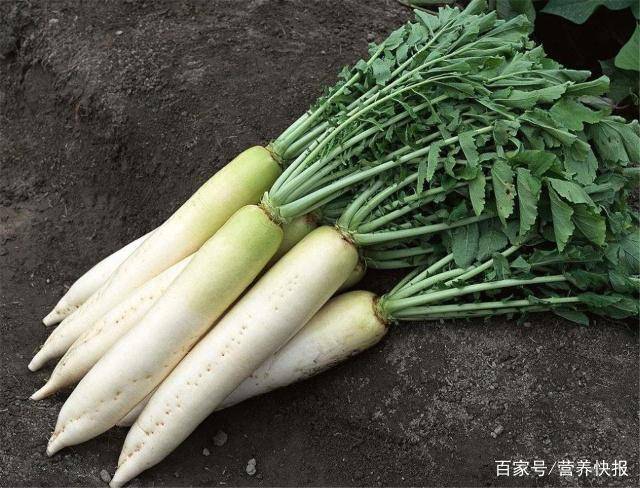We often hear the saying, “Eating radish in winter is better than ginseng,” which shows that consuming radish during the cold winter has many benefits for the body. Not only does the white radish itself have high nutritional value, but the water boiled from white radish also has great digestive and stomach-nourishing effects.
White radish is cool and sweet in flavor, with various functions such as relieving cough, aiding digestion, detoxifying, generating body fluids, and promoting urination and bowel movement, earning it the title of “king of vegetables.” Today, let’s explore the nutritional value and benefits of white radish.
1. Detoxification and Cancer Prevention
White radish is rich in dietary fiber, which helps accelerate intestinal peristalsis, relieve constipation, detoxify the body, and improve rough skin conditions. Additionally, white radish contains a type of lignin that enhances the ability to engulf cancer cells, and the decomposition of carcinogenic ammonium nitrite found in radish has certain cancer-preventive effects. Therefore, it is advisable to eat white radish regularly.
2. Cough Relief and Phlegm Reduction
White radish is cool in nature and sweet in taste, abundant in vitamin C and trace elements like zinc. These nutrients can help improve the body’s immunity and enhance disease resistance, providing excellent anti-inflammatory, cough-relieving, phlegm-reducing, and qi-regulating benefits. It is helpful in assisting the treatment of various diseases, including colds. Moreover, pairing white radish with pears is an excellent match and one of the best foods for alleviating cough.
3. Boosting Immunity
The lignins, enzymes, and minerals in radishes may help lower blood lipids, soften blood vessels, and stabilize blood pressure, while also significantly enhancing the body’s immunity. Eating radish in winter can also help prevent frostbite to some extent.
While radish offers numerous benefits, it is not suitable for everyone. For instance, the following two groups of people should limit their intake:
1. Those with Spleen Deficiency
Due to radish’s gas-relieving and digestive properties, people with diarrhea and weak spleens and stomachs should exercise caution. For this group, it is advisable to consume less white radish because excessive gas movement can exacerbate the deficiency, making it difficult to improve the condition and even worsening weaknesses.
2. Patients with Chronic Obstructive Pulmonary Disease (COPD) and Asthma
Because radish is cool in nature, with spicy and sweet flavors, it has heat-clearing, phlegm-reducing, and moisture-regulating effects. Therefore, individuals with cough and wheezing due to coldness should limit their radish intake.


